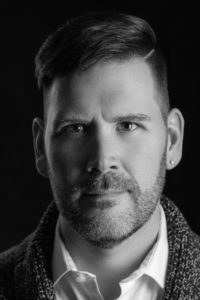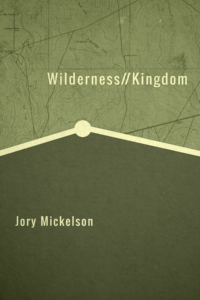 JORY MICKELSON‘s first book Wilderness//Kingdom is the inaugural winner of the Evergreen Award Tour prize from Floating Bridge Press and was the 2020 High Plains Book Award winner in Poetry. Their work has appeared in Court Green, Painted Bride Quarterly, Mid-American Review, The Rumpus, and other journals. They were awarded an Academy of American Poets Prize and have received fellowships from the Lambda Literary Foundation and The Helene Wurlitzer Foundation of New Mexico. www.jorymickelson.com JORY MICKELSON‘s first book Wilderness//Kingdom is the inaugural winner of the Evergreen Award Tour prize from Floating Bridge Press and was the 2020 High Plains Book Award winner in Poetry. Their work has appeared in Court Green, Painted Bride Quarterly, Mid-American Review, The Rumpus, and other journals. They were awarded an Academy of American Poets Prize and have received fellowships from the Lambda Literary Foundation and The Helene Wurlitzer Foundation of New Mexico. www.jorymickelson.com |
Wilderness//Kingdom, Floating Bridge Press, 2019.
Synopsis: Wilderness//Kingdom is a sensual and poetic exploration of the West, the road, and the body—spiritual and pastoral at once.
What do you think makes your book (or any book) a “project book”?
I think many books can be called “project books” as an offhand category to fit them into. Books that have specific constraints—subject matter, location, historical periods, poetic forms—are often considered project books. So regional poetics, documentary poetry, etc., may find themselves in this category.
Why this subject (or constraint)?
Wilderness//Kingdom is an examination of queerness within the tropes, myths, and landscape of the American West. As a queer person who grew up in the rural West, there is little or no representation of my own and others’ experience. I thought it was important to tell the story of queerness within this landscape.
Are you comfortable with the term “project book”?
I am, and yet I also resist it. I feel that my book could just as often be described as regional poetry, or gay poetry. So many authors face limiting descriptions of their work. Often when something is narrowly categorized, the work can be dismissed by certain audiences. These terms are often used as marketing descriptors, a kind of branding.
Identity is one of the easiest or clearest markers in the writing world; therefore it can be difficult to see yourself as a writer or your work reduced—to women’s poetry, trans poetics, etc. That said, I think the widening of voices and identities in the writing world is necessary and also fantastic. I am thrilled to see so many marginalized voices find platforms that have been traditionally closed to them.
Was your project defined before you started writing? To what degree did it develop organically as you added poems?
I wrote into the book blind. The pile of poems kept growing, and I didn’t realize what I was saying or setting out to accomplish until I had a critical mass of work. For me, themes often emerge after the writing. Ultimately, the poems were part of my longing to be seen in a genre or region where LGBTQ+ people so often remain hidden away.
How important was it for you that each poem could “stand on its own” or that the poems should rely on other poems in the book, or on the premise of the project itself, to succeed?
For myself, it was important that the poems could stand by themselves. The one exception was a longer poem that became its own section, “Self-Portrait with Men in Cars.” This poem had dozens of sections, each different from one another. It began as an exercise to see how differently I could write from one section to the next. It became an obsession. Only about half of the poem’s sections appear in the book.
At any point did you feel you were including (or were tempted to include) weaker poems in service of the project’s overall needs? This is a risk, and a common critique, of many project books. How did you deal with this?
I did include weaker poems when I submitted the book because they “fit” with my theme. Thankfully, I had an incredible editor, Michael Schmeltzer at Floating Bridge, who helped me find the final shape of the book. He did some handholding and coaxing, but often his judgement—seeing the book as a whole—was a lifesaver.
Did you fully immerse yourself in writing this project book, or did you allow yourself to work on other things?
Usually, I sit down and write the poems that come, without thinking, “Okay, time to write the next X poem.” I have become more focused in my writing. With the second manuscript, an exploration of nineteenth-century Western (Montana) history and what it can tell us about today, I had to think ahead. At one point I was saying things like, “Oh I still need a cemetery poem,” or “I still need to talk about logging.” It was a different, more focused animal.
Do you have a sense of whether the fact that this is a project book helped position it to find publication more easily?
Honestly, I don’t know. I knew that some regional presses might pass on it because of the queer content. I also know that some queer presses passed on it because it didn’t feel urban or contemporary enough. Wilderness landed at an uncomfortable crossroads. But it was also a book I hadn’t seen before, or seen enough of.
What project books have influenced you or have you enjoyed, and what do you think makes those books successful?
If I think about it, I would have to say the first one that knocked me out was Ellen Bryant Voigt’s Kyrie, a book of sonnets about the 1919 flu pandemic. Rereading it in 2020 is even more haunting. Voigt is a master of craft, so the book feels gorgeous and the sonnets effortless. If I had tried to write it, it would have come off clunky and dismal I also love several of CA Conrad’s books centered around projects or themes. My favorite is their Advanced Elvis Course—an entire book about their obsession with Elvis Presley.
Have you abandoned other project attempts? How did you know it was time to let go? What happens to project poems that never amass a full-length book?
I am currently at work on a new suite of poems. I know they won’t accumulate into a book-length collection. They may become a chapbook or just exist on their own. For me, I think the most important part of poetry is to do the writing that comes. Everything else can be worried about afterward.
After completing a project, how did you transition into writing something new? What are you working on now? Another project?
I started doing research for a new manuscript just as Wilderness//Kingdom was coming out. I didn’t want the business of promoting a book to become my only poetic practice. I dug into the research and didn’t worry about drafting new poems. I needed to fill up on the subject before the poems came.
The new book, title yet uncertain, is about how nineteenth-century Western history informs our present world filled with crisis. How can the past reveal the roots of and also a possible solution to the dilemmas of modern life?
What advice can you offer other writers, particularly emerging writers or poetry students who may be using the project book as a guiding principle for their own work?
Don’t forget to play. I think play and experimentation keeps things fresh and engaging. It is okay to break a few rules or even branch out into new territory. This might feel like straying, but up close, we have a hard time (I have a hard time) seeing the bigger picture.
American Sonnets for My Past and Future Assassin, by Terrance Hayes, is endlessly inventive. Yet the argument can be made that all the poems are sonnets in one way or another. (Jason Snyderman has some brilliant comments about this in his essay “How the Sonnet Turns: From a Fold to a Helix,” in American Poetry Review Vol 49, Issue 3). Don’t let your original constraints choke the joy out of writing. Allow yourself to be surprised.


